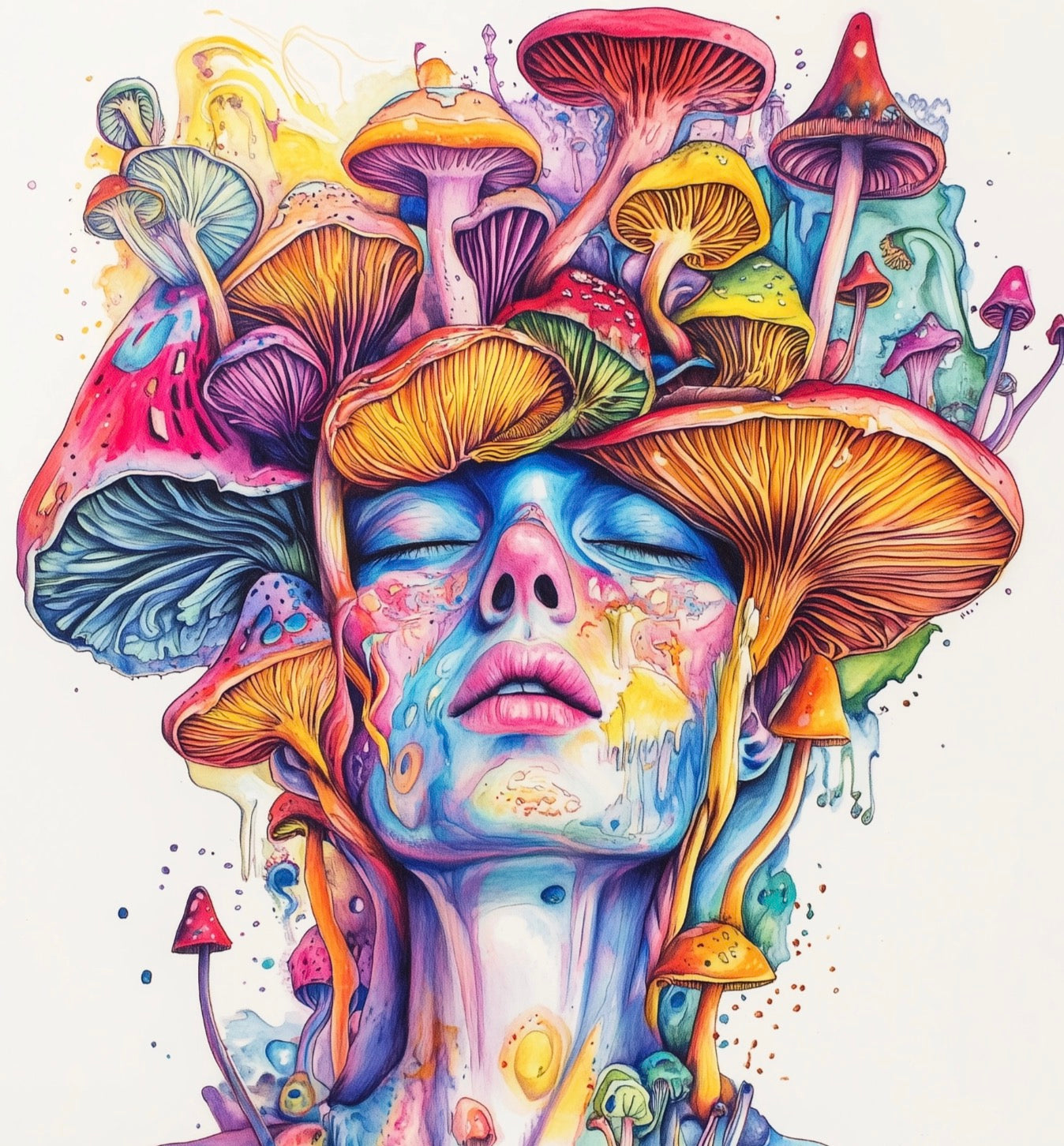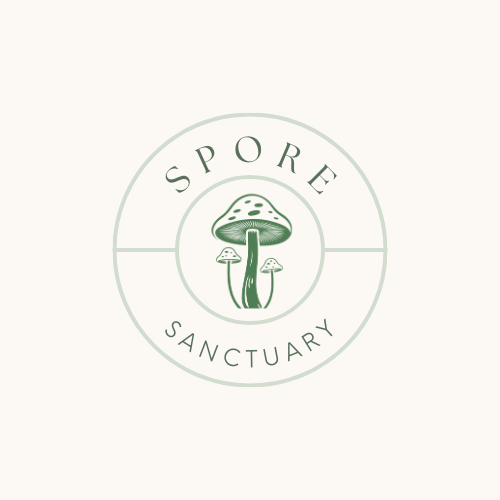SUMMARY
This blog post explores the impact of psilocybin, the active compound in magic mushrooms, on the brain's Default Mode Network (DMN). It explains the DMN's role in self-reflection and daydreaming, and how psilocybin disrupts its normal functioning. The post highlights recent research findings, including:Psilocybin's ability to desynchronize the DMNIts effect on brain connectivity and identity perceptionThe temporary nature of most changes, with some lasting up to three weeksPotential therapeutic applications for mental health conditions
Table of content
Unlocking the mysteries of the human brain has always been an alluring quest for scientists and researchers. One particular psychedelic compound, psilocybin, has recently captured their attention due to its profound impact on the brain's Default Mode Network (DMN). This network, responsible for self-reflection and introspection, appears to undergo significant alterations under the influence of psilocybin. In this article, we delve into the inner workings of psilocybin and its impact on the DMN. Through cutting-edge research and studies, we uncover the transformative effects of this psychedelic compound on consciousness and cognition. By exploring its influence on the DMN, we aim to shed light on the mechanisms behind the profound experiences reported by individuals who have experienced psilocybin-induced states of mind. Join us as we navigate the intriguing world of psilocybin and the fascinating ways in which it interacts with the brain's Default Mode Network. Gain a deeper understanding of the potential therapeutic applications of psilocybin and the implications it holds for mental health and human consciousness. Discover the latest insights into the profound influence of psilocybin on the Default Mode Network, unlocking a deeper understanding of our human experience.
What is the Default Mode Network and Its Functions?
The Default Mode Network (DMN) is a complex network of brain regions that shows increased activity when an individual is at rest and not focused on the external environment. It has been identified as a key player in self-referential thought processes, including daydreaming, recalling past experiences, and imagining future scenarios. The DMN comprises several interconnected areas, including the medial prefrontal cortex, posterior cingulate cortex, and the angular gyrus, all of which contribute to our sense of self and personal identity. br/>
One of the primary functions of the DMN is to facilitate introspection and self-awareness. It allows individuals to reflect on their thoughts, emotions, and memories, forming a continuous narrative of the self. This network is also crucial for understanding social dynamics, as it helps us empathize with others and ponder their perspectives. However, when the DMN becomes overly active, as seen in certain mental health disorders, it can lead to rumination and negative thought patterns, contributing to conditions such as anxiety and depression. br/>
Researchers have begun to unravel the intricate relationship between the DMN and our cognitive processes. Studies suggest that this network plays a role in creativity and problem-solving, as it enables us to connect disparate ideas and think outside conventional frameworks. By understanding the DMN’s functions, we can better appreciate how alterations in this network may influence our overall mental well-being and cognitive capabilities. br/>
The Effects of Psilocybin on the Default Mode Network
Psilocybin, the active compound found in certain species of mushrooms, has been shown to produce profound alterations in consciousness. When ingested, psilocybin is converted into psilocin, which interacts with serotonin receptors in the brain, particularly the 5-HT2A receptor. This interaction leads to a cascade of neurochemical changes that significantly affect the DMN. br/>
Research has demonstrated that psilocybin reduces the coherence and connectivity of the DMN, which correlates with experiences of ego dissolution and altered self-perception reported by users. Users often describe a sense of interconnectedness with the universe and a diminished sense of self as the DMN becomes less active. This decoupling of the DMN can lead to novel insights and perspectives, as the brain becomes less constrained by habitual thought patterns that typically dominate our conscious experience. br/>
Furthermore, the impact of psilocybin on the DMN is not merely a reduction in activity but a reorganization of how different brain regions communicate with one another. This shift creates a more integrated brain state, allowing for enhanced access to emotional memories and creative thought processes. Many individuals report experiencing profound emotional breakthroughs and a greater sense of clarity following psilocybin experiences, suggesting that its influence on the DMN can facilitate positive psychological changes. br/>
Research Findings on Psilocybin and the Default Mode Network
Recent studies utilizing advanced imaging techniques such as fMRI and PET scans have provided valuable insights into how psilocybin affects the DMN. One landmark study conducted by researchers at Imperial College London found that participants who ingested psilocybin exhibited a marked decrease in DMN activity compared to a placebo group. This reduction in activity was associated with the subjective experience of ego dissolution, highlighting the connection between brain function and personal consciousness. br/>
Another notable research project investigated the effects of psilocybin on individuals with treatment-resistant depression. The findings revealed a significant decrease in DMN connectivity, which was correlated with improvements in mood and reductions in depressive symptoms. These results suggest that psilocybin may offer a novel approach to addressing mental health disorders by targeting the underlying neural mechanisms associated with the DMN. br/>
Moreover, long-term follow-up studies have shown that the positive effects of psilocybin can persist for weeks or even months after the initial experience. Participants reported lasting changes in their outlook on life, increased emotional well-being, and improved psychological resilience. This enduring impact may be due to the way psilocybin reshapes the DMN, allowing individuals to adopt healthier thought patterns and emotional responses. br/>
The Potential Therapeutic Uses of Psilocybin and the Default Mode Network
The therapeutic potential of psilocybin is gaining recognition within the field of mental health. As research continues to unveil the complex relationship between psilocybin and the DMN, mental health professionals are exploring its applications in various therapeutic contexts. The ability of psilocybin to disrupt entrenched cognitive patterns offers a unique opportunity to address conditions such as depression, anxiety, PTSD, and addiction. br/>
One of the most promising areas of research involves psilocybin-assisted therapy, where the compound is administered in a controlled setting alongside psychological support. This approach allows individuals to confront and process difficult emotions and experiences in a safe and guided environment. The alterations in DMN activity during psilocybin experiences may facilitate this therapeutic process, enabling patients to access deep-seated emotional memories and gain new insights into their struggles. br/>
Furthermore, psilocybin has shown potential in enhancing the therapeutic alliance between patients and therapists. The profound experiences often reported by individuals under the influence of psilocybin can foster feelings of trust and connection, creating a conducive environment for healing. As mental health professionals continue to explore the possibilities of psilocybin therapy, the implications for treating a wide range of psychological disorders appear increasingly promising. br/>
Psilocybin-Assisted Therapy and Its Impact on the Default Mode Network
Psilocybin-assisted therapy combines the effects of psilocybin with traditional therapeutic practices to create a holistic approach to mental health care. In clinical settings, trained therapists guide patients through their psilocybin experiences, providing support and facilitating discussions about the insights gained during the session. This therapeutic model offers a structured framework for individuals to navigate the often-intense emotional landscapes that arise during psilocybin experiences. br/>
Research indicates that psilocybin-assisted therapy can lead to significant reductions in symptoms associated with various mental health disorders. For instance, studies have reported improvements in anxiety and depression among cancer patients following psilocybin-assisted therapy sessions. The altered state of consciousness induced by psilocybin allows individuals to confront mortality and existential concerns, often resulting in transformative psychological shifts. br/>
Moreover, the therapeutic impact of psilocybin on the DMN can provide a unique avenue for exploring the roots of psychological distress. As the DMN becomes less rigid under psilocybin's influence, individuals may gain the ability to reframe negative thought patterns and develop healthier coping mechanisms. This process of cognitive restructuring can lead to long-lasting changes in how individuals perceive themselves and their challenges, ultimately promoting resilience and well-being. br/>
How Psilocybin Can Enhance Creativity and Problem-Solving Through the Default Mode Network
The relationship between psilocybin and creativity has garnered considerable interest among researchers and artists alike. The DMN plays a crucial role in creative thinking, as it allows for the free association of ideas and the exploration of novel connections. By altering DMN activity, psilocybin may enhance creative problem-solving abilities and facilitate innovative thinking. br/>
Studies suggest that psilocybin can lead to increased divergent thinking, a cognitive process associated with generating multiple solutions to a given problem. Participants in studies often report experiencing a heightened sense of inspiration and creativity following psilocybin sessions. This enhancement may stem from the decoupling of the DMN from more critical, evaluative brain networks, allowing for a more fluid and open-minded approach to idea generation. br/>
Furthermore, the emotional insights often gained during psilocybin experiences can spark new ways of thinking about creative challenges. By accessing deeper layers of consciousness, individuals may find themselves inspired by personal experiences or emotions that inform their creative work. This intersection between psilocybin, the DMN, and creativity suggests that harnessing psilocybin in a creative context could lead to groundbreaking innovations across various fields. br/>
The Future of Psilocybin Research and Its Implications for Understanding the Default Mode Network
As interest in psilocybin research continues to grow, future studies are likely to further elucidate its effects on the Default Mode Network and broader aspects of human cognition. Researchers are actively exploring the potential of psilocybin to treat mental health disorders, enhance creativity, and improve overall well-being. The ongoing investigation into the interplay between psilocybin and the DMN holds the promise of revealing fundamental insights into the nature of consciousness itself. br/>
Additionally, advancements in neuroimaging technology will allow researchers to gain a more nuanced understanding of how psilocybin affects brain connectivity and activity. By mapping the intricate dynamics of the DMN and its interaction with other brain networks, scientists may uncover new therapeutic targets and strategies for addressing mental health challenges. This research could pave the way for the development of novel psychoactive therapies, broadening the scope of mental health care. br/>
Moreover, as societal attitudes toward psychedelics continue to shift, the integration of psilocybin into mainstream therapeutic practices may become a reality. This transition could lead to more comprehensive approaches to mental health treatment, incorporating psilocybin-assisted therapy as a valuable tool in addressing a range of psychological disorders. Ultimately, this evolving landscape of psilocybin research may reshape our understanding of the mind, consciousness, and the intricate workings of the Default Mode Network. br/>
Risks and Considerations When Working with Psilocybin and the Default Mode Network
While the potential benefits of psilocybin are promising, it is essential to approach its use with caution and awareness of the associated risks. Psilocybin can induce intense psychological experiences, which may not be suitable for everyone. Individuals with a personal or family history of mental health disorders, particularly those predisposed to psychosis, may be at a heightened risk of adverse reactions during psilocybin experiences. br/>
Furthermore, the setting and context in which psilocybin is consumed play a critical role in shaping the overall experience. Uncontrolled environments or unsupervised use can lead to overwhelming experiences and potential psychological distress. For this reason, psilocybin-assisted therapy conducted in clinical settings with trained professionals is recommended to ensure safety and support. br/>
Finally, ongoing research into the long-term effects of psilocybin on mental health is needed to fully understand its risks and benefits. While initial studies show promising results, it is crucial to continue investigating the implications of psilocybin use, particularly concerning the DMN and its role in mental health. By prioritizing safety, ethical considerations, and informed practices, we can work toward harnessing the transformative potential of psilocybin in a responsible manner. br/>
Conclusion: The Transformative Potential of Psilocybin on the Default Mode Network
The exploration of psilocybin's influence on the Default Mode Network represents a fascinating intersection of neuroscience, psychology, and spirituality. As we delve deeper into the mechanisms by which psilocybin alters brain function, we uncover a wealth of knowledge about consciousness, creativity, and the human experience. The ability of psilocybin to reshape the DMN opens up new avenues for therapeutic applications, offering hope for those struggling with mental health challenges. br/>
Furthermore, the insights gained from psilocybin research may not only advance our understanding of mental health but also contribute to a broader understanding of human consciousness itself. As we continue to study the intricate dance between psilocybin and the DMN, we may unlock new perspectives on our thoughts, emotions, and the nature of reality. br/>
In conclusion, the transformative potential of psilocybin on the Default Mode Network is a testament to the complexity of the human mind. As research progresses and societal attitudes evolve, we stand on the brink of a new era in mental health care, where psilocybin may play a central role in fostering healing, creativity, and self-discovery. The journey of understanding psilocybin and its impact on the DMN is just beginning, and the possibilities it holds are as profound as the experiences it enables. br/>
Frequently Asked Questions
The Default Mode Network is a set of interconnected brain areas that are active when we're not focused on a specific task. It's involved in self-reflection, daydreaming, and thinking about the past or future.
Psilocybin temporarily disrupts and desynchronizes the DMN, which can lead to altered perceptions of self, time, and space during a psychedelic experience.
Most brain activity returns to normal the day after psilocybin use. However, some changes, like decreased communication between the DMN and hippocampus, can persist for up to three weeks.
Understanding how psilocybin affects the DMN could lead to new treatments for mental health conditions like depression and PTSD by helping break rigid thought patterns.
While research shows potential benefits, psilocybin is a powerful substance and is illegal in many jurisdictions. It should only be used in controlled, clinical settings under professional supervision.
Some studies suggest that psilocybin experiences can lead to increased openness and flexibility in thinking, but more research is needed to fully understand its long-term effects on personality.




Share and get 15% off!
Simply share this product on one of the following social networks and you will unlock 15% off!